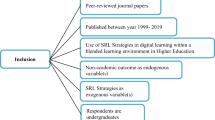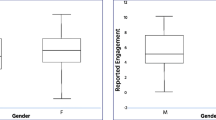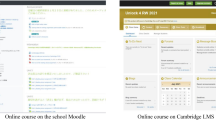Abstract
Although learning styles are considered as an important factor in education, students often have to learn in courses that do not support their learning styles. A challenge for technology facilitated learning is therefore to assist and help students to cope with courses that do not match their learning styles by training and developing their less preferred skills. In this paper, the interactions between students’ learning styles, their behaviour, and their performance in an online course that is mismatched regarding their learning styles were analysed. The results show which learners need more help in mastering mismatched courses, help in getting a better understanding about how students with good performance record and poor performance record learn with respect to their learning styles, and provide information about how to identify learners who might have difficulties in learning based on their behaviour.
Similar content being viewed by others
References
Bajraktarevic, N., Hall, W., & Fullick, P. (2003). Incorporating learning styles in hypermedia environment: Empirical evaluation. In P. de Bra, H. C. Davis, J. Kay, & M. Schraefel (Eds.), Proceedings of the workshop on adaptive hypermedia and adaptive web-based systems (pp. 41–52). Nottingham, UK: Eindhoven University.
Botsios, S., Georgiou, D., & Safouris, N. (2008). Contributions to adaptive educational hypermedia systems via on-line learning style estimation. Educational Technology & Society, 11(2), 322–339.
Briggs Myers, I. (1962). Manual: The Myers-Briggs type indicator. Palo Alto, CA: Consulting Psychologists Press.
Brown, E., Brailsford, T., Fisher, T., Moore, A., & Ashman, H. (2006). Reappraising cognitive styles in adaptive web applications. In L. Carr, D. De Roure, A. Iyengar, C. A. Goble, & M. Dahlin (Eds.), Proceedings of the international world wide web conference (pp. 327–335). New York: ACM Press.
Carver, C. A., Howard, R. A., & Lane, W. D. (1999). Addressing different learning styles through course hypermedia. IEEE Transactions on Education, 42(1), 33–38. doi:10.1109/13.746332.
Entwistle, N. J. (1981). Styles of learning and teaching. New York: Wiley.
Felder, R. M., & Silverman, L. K. (1988). Learning and teaching styles in engineering education. Engineering Education, 78(7), 674–681.
Felder, R. M., & Soloman, B. A. (1997). Index of Learning Styles questionnaire. Retrieved November 27, 2008, from http://www.engr.ncsu.edu/learningstyles/ilsweb.html.
Felder, R. M., & Spurlin, J. (2005). Applications, reliability and validity of the Index of Learning Styles. International Journal on Engineering Education, 21(1), 103–112.
García, P., Amandi, A., Schiaffino, S., & Campo, M. (2007). Evaluating Bayesian networks’ precision for detecting students’ learning styles. Computers & Education, 49(3), 794–808. doi:10.1016/j.compedu.2005.11.017.
Graf, S. (2007). Adaptivity in learning management systems focussing on learning styles. Ph.D. thesis, Vienna University of Technology.
Graf, S., & Kinshuk. (2007). Providing adaptive courses in learning management systems with respect to learning styles. In G. Richards (Ed.), Proceedings of the world conference on e-learning in corporate, government, healthcare, and higher education (e-Learn) (pp. 2576–2583). Chesapeake, VA: AACE Press.
Graf, S., & Kinshuk. (2008). Analysing the behaviour of students in learning management systems with respect to learning styles. In M. Wallace, M. Angelides, & P. Mylonas (Eds.), Advanced in semantic media adaptation and personalization, series on studies in computational intelligence (Vol. 93, pp. 53–74). Berlin/Heidelberg: Springer.
Graf, S., Kinshuk, & Liu, T.-C. (2008a). Identifying learning styles in learning management systems by using indications from students’ behaviour. In P. Diaz, Kinshuk, I. Aedo, & E. Mora (Eds.), Proceedings of the international conference on advanced learning technologies (pp. 482–486). Santander, Spain: IEEE Computer Science.
Graf, S., Liu, T.-C., & Kinshuk. (2008b). Interactions between students’ learning styles, achievement and behaviour in mismatched courses. In Kinshuk, D. G. Sampson, J. M. Spector, P. Isaías, & D. Ifenthaler (Eds.), Proceedings of the IADIS international conference on cognition and exploratory learning in the digital age (pp. 223–230). Freiburg, Germany: IADIS Press.
Honey, P., & Mumford, A. (1982). The manual of learning styles. Maidenhead: Peter Honey.
Karagiannidis, C., & Sampson, D. G. (2004) Adaptation rules relating learning styles research and learning objects meta-data. In G. D. Magoulas & S. Y. Chen (Eds.), Proceedings of the international conference on adaptive hypermedia and adaptive web-based systems (pp. 136–145). Eidhoven, Netherlands: TU/e Pub.
Kolb, D. A. (1984). Experiential learning: Experience as the source of learning and development. Englewood Cliffs, New Jersey: Prentice-Hall.
Kuljis, J., & Liu, F. (2005). A comparison of learning style theories on the suitability for elearning. In M. H. Hamza (Ed.), Proceedings of the IASTED conference on web technologies, applications, and services (pp. 191–197). Calgary, Alberta: ACTA Press.
Liegle, J. O., & Janicki, T. N. (2006). The effect of learning styles on the navigation needs of web-based learners. Computers in Human Behavior, 22(5), 885–898. doi:10.1016/j.chb.2004.03.024.
Lu, H., Jia, L., Gong, S.-H., & Clark, B. (2007). The relationship of Kolb learning styles, online learning behaviors and learning outcomes. Educational Technology & Society, 10(4), 187–196.
Manouselis, N., & Sampson, D. G. (2002). Dynamic knowledge route selection for personalised learning environments using multiple criteria analysis. In M. H. Hamza (Ed.), Proceedings of the IASTED international multi-conference on applied informatics (pp. 351–605). Innsbruck, Austria: ACTA Press.
Messick, S. (1976). Personal styles and educational options. In S. Messick (Ed.), Individuality in learning (pp. 327–368). San Francisco: Jossey Bass.
Moodle. (2008). Retrieved November 27, 2008, from http://www.moodle.org.
Papanikolaou, K. A., Grigoriadou, M., Kornilakis, H., & Magoulas, G. D. (2003). Personalizing the interaction in a web-based educational hypermedia system: The case of INSPIRE. User Modeling and User-Adapted Interaction, 13(3), 213–267. doi:10.1023/A:1024746731130.
Paredes, P., & Rodríguez, P. (2004). A mixed approach to modelling learning styles in adaptive educational hypermedia. Advanced Technology for Learning, 1(4), 210–215. doi:10.2316/Journal.208.2004.4.208-0823.
Pask, G. (1976). Styles and strategies of learning. The British Journal of Educational Psychology, 46, 128–148.
Stash, N., Cristea, A., & de Bra, P. (2006). Adaptation to learning styles in e-learning: Approach evaluation. In T. Reeves & S. Yamashita (Eds.), Proceedings of world conference on e-learning in corporate, government, healthcare, and higher education (pp. 284–291). Chesapeake, VA: AACE Press.
Acknowledgements
The authors wish to acknowledge the support of iCORE, Xerox and the research related gift funding provided to the Learning Communities Project by Mr. Allan Markin. The authors would like to thank the National Science Council of the Republic of China, Taiwan, for financially supporting this research under Contract No. NSC 96-2520-S-008-007-MY2, NSC 097-2811-S-008-001-, and NSC 97-2631-S-008-003-.
Author information
Authors and Affiliations
Corresponding author
Additional information
An earlier version of this paper was presented at the IADIS International Conference of Cognition and Exploratory Learning in Digital Age (Graf et al. 2008b).
Rights and permissions
About this article
Cite this article
Kinshuk, Liu, TC. & Graf, S. Coping with mismatched courses: students’ behaviour and performance in courses mismatched to their learning styles. Education Tech Research Dev 57, 739–752 (2009). https://doi.org/10.1007/s11423-009-9116-y
Published:
Issue Date:
DOI: https://doi.org/10.1007/s11423-009-9116-y




